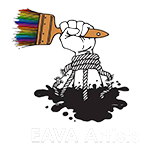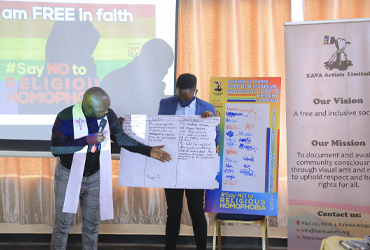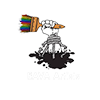Religious leaders play an essential role in education, health, politics, culture, and public morality in Ugandan communities. They can exacerbate or reduce the stigmatisation of LGBTI communities worldwide in a context that has always been homophobic.
EAVA Artists organised a capacity-building workshop for Uganda’s affirming religious leaders to help with this. To increase faith leaders’ understanding of LGBTI inclusion diversity in places of worship and promote a shared understanding of sexual diversity and human rights.
“The key to addressing the rise in homophobia is to change the narrative about homosexuality. The language used to talk about sexuality needs to reflect local perspectives more accurately. And more meaningful connections need to be drawn between the rights of LGBTQI people and Ugandan notions of humanity, dignity, and respect.” Vincent, the Director of EAVA Artists, mentioned
The training is part of a series of story-sharing sessions about religious homophobia and effective advocacy with various faith leaders. The ultimate goal is to protect LGBTI persons from the toxic gospel that directly impacts their mental well-being and abuse and to have an inclusive society where LGBTI persons don’t fear for their lives.

“We need to see religious leaders who are accepting of LGBTI people. As a result of this training, we will comprehend radical inclusivity and practice it. It is critical for people of faith to be welcoming and non-discriminatory. We should tell others that it’s okay to be ourselves.” Vincent further mentioned.
The session covered religious inclusion, understanding diversity in faith, LGBTIQ advocacy, and lobbying, and power mapping. These helped participants to understand religious homophobia so that they could overcome it.
Sharing during the workshop, Bishop Wencelace mentioned how as a gay priest, he faced a lot of homophobia and was fired by the Catholic Church, forcing him to live in self-exile in Nigeria and Rwanda because the church refused to accept him as an openly gay priest. Being a member of the LGBTI community has taught him that discrimination results in death.
“We are all humans, and we were all created in the image of God regardless of whether we are homosexuals or not. A human being wants to feel very important, which isn’t bad because God himself is important and wise; however, we should not use our power and closeness to God to promote hate speech. We should be welcoming and with open arms.” Bishop Senyonjo mentioned.
Vincent appreciated faith leaders who actively participated in the three-day workshop. He urged the stakeholders to advocate and be a vessel of change to uphold the human rights and fundamental freedoms of the LGBTIQ communities. We need to accept marginalised communities regardless of their differences. My team will continue working with various stakeholders and faith leaders. He concluded his remarks by calling for peace and love from the faith leaders and urged them to create a safe and inclusive space for LGBTIQ people and provide pastoral care for all communities in Uganda.





